|
July, 2005
Aug. 2005
Sept. 2005
Oct. 2005
Nov. 2005
Dec. 2005
Jan. 2006
Feb. 2006
Mar. 2006
Apr. 2006
May 2006
June 2006
July 2006
August 2006
September 2006
October 2006
November 2006
December 2006
January 2007
February 2007
March 2007
April 2007
May 2007
June 2007
July 2007
August 2007
September 2007
October 2007
November 2007
December 2007
February 2008
March 2008
April 2008
May 2008
June 2008
July 2008
August 2008
September 2008
October 2008
November 2008
December 2008
February 2009
March 2009
April 2009
May 2009
July 2009
August 2009
September 2009
November 2009
December 2009
January 2010
February 2010
March 2010
April 2010
May 2010
June 2010
July 2010
September 2010
October 2010
November 2010
December 2010
January 2011
February 2011
March 2011
April 2011
May 2011
June 2011
July 2011
September 2011
October 2011
December 2011
February 2012
April 2012
June 2012
July 2012
August 2012
October 2012
November 2012
February 2013
May 2013
July 2013
August 2013
October 2013
November 2013
April 2014
July 2014
October 2014
March 2015
May 2015
September 2015
October 2015
November 2015
August 2016
March 2017
January 2019
May 2019
August 2019
March 2020
April 2020
May 2020
July 2020
October 2020
January 2021
February 2021
August 2021
January 2022
February 2022
April 2022
June 2022
ČERVENÁ BARVA PRESS NEWSLETTER
Gloria Mindock, Editor Issue No. 110 August, 2022
INDEX
Cervena Barva Press August Newsletter, 2022
Hi Everyone,
Hope you are enjoying your summer so far!
Cervena Barva Press would like to welcome new staff members. I am so excited to have them be a part of the press.
Avil Tran interned with me in the spring from Lesley University. She now will be working with me this year. I am so
happy to have her help. Here is her bio and photo.
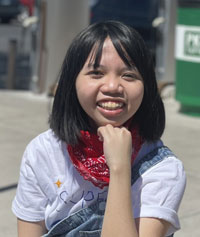
Avil (Nguyen) Khai Tran is a new graduate from Lesley University's College of Arts and
Sciences, where she pursued her Bachelor's degree in Creative Writing and a minor in
Education. Avil was a recipient of the Lesley Presidential scholarship and Linda Dacey
scholarship for four consecutive years and eventually graduated with top honors. She is
also a member of Sigma Tau Delta - the International English Honor Society, and Phi
Eta Sigma - one of the oldest and largest honor societies in the United States. Born and
raised in Vietnam, yet experiencing great difficulty expressing herself in her mother
tongue due to her hypersensitivity, Avil has quickly fallen in love with English as her
second language. She dreams of becoming a young adult and children's fiction writer
whose voice can transcend the boundary between the Eastern culture she has grown
up with and the Western culture she is surrounded by.
Another new staff member is John Riley. He is a wonderful reviewer and writer. I am so happy to have him be a part of
the press. Here is his bio and photo.
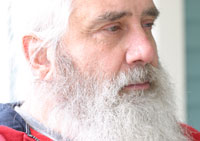
John Riley's career in writing and publishing goes back over thirty years. He was the founder, publisher,
and Editor-in-Chief of Morgan Reynolds Publishing, a publishing house devoted to publishing nonfiction for
young-adult readers. During his years with Morgan Reynolds, he wrote or rewrote nearly a hundred books on
topics varying from biographies of writers, scientist, political leaders, musicians, among other categories,
as well as books on topics, such as diseases, the development of science and the scientific method, economics,
environment, historical events and controversies, civil rights and the women's movement, and many more.
Essentially, the focus of Morgan Reynolds was to expand student's knowledge in directions and at depths textbooks
did not attempt. Morgan Reynolds was fortunate to win awards from School Library Journal, Booklist, the American
Library Association, and other organizations committed to promoting high-quality young adult nonfiction. After
selling Morgan Reynolds, John Riley began devoting his attention to writing his own poetry, fiction, and occasional
nonfiction. His poems and stories have been published in a many journals online and in print, including
Smokelong Quarterly, Eclectica, Comstock Review, The Ekphrastic Review, Better Than Starbucks, Banyan Review,
Bindweed, and Connotiation Press. He has published reviews in Litro, Cultural Daily, Cervena Barva Press,
and other journals. EXOT Books will
publish a volume of 100 of his 100-word prose poems in the fall of 2022.

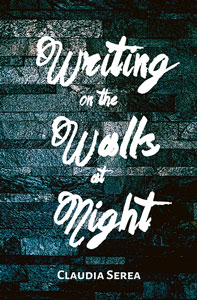
Claudia Serea's poems and translations have been published in Field, New Letters, Prairie Schooner, The Malahat Review,
The Puritan, Oxford Poetry, Asymptote, and elsewhere. She is the author of six poetry collections and four chapbooks,
most recently Writing on the Walls at Night (Unsolicited Press, 2022). She is the recipient of the
Joanne Scott Kennedy Memorial Prize from the Poetry Society of Virginia, the New Letters Readers Award,
the Franklin-Christoph Merit Award, as well as several honorable mentions and short-lists for her poems
and books. Her poems have been translated in Russian, French, Italian, Arabic, and Farsi, and have been
featured on The Writer's Almanac. Her collection of selected poems translated into Arabic,
Tonight I'll Become a Lake into which You'll Sink, was published in Cairo, Egypt, in 2021.
Serea is a founding editor of National Translation Month, serves on the editorial board of The Red Wheelbarrow Poets,
and is one of the curators of the Red Wheelbarrow Poetry Readings.
1. When did you begin writing, Claudia?
I started by writing prose first, not poetry. I think I was in 6th or 7th grade. My best friend Ioana
and I started to write sci-fi novels to entertain ourselves. I wrote a trilogy about kids our age who had
adventures in space. She wrote about kids having adventures in the Bermuda Triangle. It was fun!
Each week we'd exchange our notebooks, read, and commented on what the other wrote. The first
ever creative workshop, lol.
Poetry came a bit later, in high school. I wrote through my first 3 years of college but published very
little in Romania. After the regime change in 1989, I went on a long hiatus because life got in the way.
Everything was changing very fast and continued to change when I emigrated to the US in 1995 and started over.
It wasn't until 2002 that I started writing poetry again in Romanian, on and off. I switched to English in 2004
when I was on maternity leave. I published one or two poems per year, and never thought poetry was really
possible until 2007 when I joined The Red Wheelbarrow Poets. The rest, as they say, is history.
2. What inspires you to write?
I find that history and human suffering throughout history permeate my poems. My writing is mostly
autobiographical, though. It takes a tragedy to know tragedy. My family had a lot to suffer during the communist
regime in Romania: political prison, forced labor camps, surveillance, and life without parole inside a jail
the size of a country, together with the rest of the population. There is no hiding from that reality-and I
think the past is important. It deserves to be written about. Those poems deserve to be told, and the victims
deserve to be heard. I feel that is my duty to write them, that I owe them that.
I love writing about New York City. I love its grittiness, strangeness, surreal at times, and
the mix of the cold concrete jungle with the warmth of the people in it. I mix that with my own immigrant
experience and the longing for my natal country and for my family which is still there.
I also write about my daughter, fairy tales, dreams. My latest collection, Writing on the Walls at Night,
is a collection of prose poems inspired by childhood memories and my immigration story. Some of the poems
are dark, and some of them are funny. I like to think that my collections suggest a dappled light,
offering glimmers of hope.
3. What was it like growing up? Can you tell us a few things about your early life?
I grew up in an industrial town in communist Romania of the '70s and '80s. My father was a chemical engineer and
my mother taught middle school Romanian and French.
Things got progressively worse in the '80s when the food and basic supplies penuria reached its heights.
Everything was rationed: bread, sugar, cooking oil, gas. The stores were empty and there were huge lines
for everything useful, not only food. We had hot water only on weekends for a couple of hours, and only
two hours of state-controlled TV each day. These things show up sometimes in my poems because they were
part of daily life.
But I had a normal childhood, pretty uneventful. I played the violin. My parents did a good job sheltering me from
everything. And you get used to not having certain things, like bananas, or cartoons. It's surprising how well
humans adapt. In high school, I started to listen to Radio Free Europe, mostly because of their rock music hour.
It was of course illegal, but everyone was doing it.
There wasn't much TV to watch, so I turned to books instead. I was always bookish and shy, so I read a lot.
In the '80s, there weren't many new translations being made because of the censorship, but the classics
were available. So I spent a lot of time reading.
Then, in 1989, the revolution happened, and the whole communist structure went bust. For the first time,
there was freedom, freedom to travel, to do anything. We didn't really know what to do with that much freedom,
except to emigrate.
4. What was the experience writing your current collection of
poems Writing on the Walls at Night? Was there one theme guiding your writing?
Writing on the Walls at Night is a collection of prose poems I wrote between 2012 and 2019.
They are a mix of history terrors, night terrors, and surreal dreams and visions that happen between
Romania and America. It's a very ironic book in my view, in which I'm trying to present the worst
moments in history and in my own immigration experience as surreal little plots which sometimes
are strange and other times are really funny. Just like in real life. Black humor is a way to cope,
I suppose.
5. Could you tell us about writing the poem There Were No Magic Beans?
This poem, and the section of the book with the same name, recall images from my childhood in Romania under
Nicolae Ceausescu's rule, a world in which terror mixes with fairy tales, nightmares, and dreams.
Specifically, the poem is about listening to The Rock Hour on Radio Free Europe. The program was
broadcasted illegally in Romania and was the only source we had to hear music by the great rock
bands of the 80s. We improvised a makeshift antenna made of copper wire that was long enough to
reach the ceiling and wrapped around the radiator pipe. Some people managed to smuggle out of
the country special song requests, and they were read in code, so no one would be able to trace
who the polka dot crocodile and the princess with a glass heart were. This kind of real detail
seems very surreal now, so that's something I like to do in this book to confuse the reader.
6. One of your poems was used to create a video poem by filmmaker Jutta Pryor.
Could you tell us about this?
It's a poem about a moth that accidentally flies into my mouth and prompts a rumination about it being the
reincarnation of a lost word, or a cry of help. It's from the second section of the book titled
"The Keepers of Moon Keys," which includes a cast of peculiar characters: witches, ghosts, a
collector of clouds, a bone music maker, a man who paints the time, and the Lord of Meanwhile, among others.
A lot of fun to read. Jutta is a very talented filmmaker and she made a beautiful, mysterious video out of it.
You can see it here: https://vimeo.com/280303836.
7. Your previous collection is Twoxism. Could you tell us a few words about it?
When my best friend Maria started to shoot street objects, she emailed me her photos, saying, "This is a love story,
this is Twoxism." There were photos of pipes, manholes, chairs abandoned at the curb, trash cans-and
she was saying: this is a love story, don't you see? And I started to write love poems for those photos,
to explore the life behind the discarded city objects, where have they been, what they have seen. That's
how Twoxism was born.
So Twoxism started as a poetry-photography collaboration blog. We had a great response to this project,
and our following grew on Instagram. In April 2017, 33 selections from the blog became an art exhibition that
opened in New York. After that, Twoxism became a book published in December 2018 by the Canadian press 8th House Publishing.
Twoxism is an invented word for all things two-among them, love, friendship, and relationships. As a project,
it finds beauty in unexpected places and sees the mundane with new eyes. As a book, it speaks of love and
relationships, with New York City in the background. It's my most "American" project, although Bucharest,
Madrid, and even Tokyo make cameo appearances.
8. What poets do you like to read? What books are currently on your nightstand?
I have many favorites, but I'll name just a few. They are writers who just speak to me, there's no other way to
describe it. Writers from which I learn and who make me want to write better. From the Romanian poets, certainly
Mircea Cartarescu, Ioan Es. Pop, Cristian Popescu, among many other crazy good young poets that I admire.
On the American side, my biggest discovery was Charles Simic. I just love him-and there is nothing better
than "The World Never Ends." Also, Anne Sexton, Sylvia Plath, James Wright, Stanley Kunitz, Jim Moore,
Russell Edson, Frank O'Hara, and so many more. I always go back to them-I have a stack on my nightstand.
And I can't forget some great international names: Anna Akhmatova, Marosa di Giorgio, Tomas Tranströmer,
Federico Garcia Lorca ("Poet In New York" was a revelation), Rilke, Neruda (especially "The Book of Questions"
and "22 Love Songs.") I should add some novelists as well: Mircea Eliade, Gabriel Garcia Marquez, Milan Kundera,
Vladimir Nabokov, Herta Muller. I could go on and on, really, but I'll stop here.
9. Could you tell us about your future plans and projects?
I'm trying to write prose, and I started a memoir, but I write very slowly. I have another book of poems about
family, history, and immigration, titled In Those Years, No One Slept, which is almost ready and will probably
come out sometime in 2023. And I recently promised my Romanian friends I will do my best to translate and publish
more poems in Romania, and maybe even a book. It won't be soon, but it will happen. Stay tuned.
Writing on the Walls At Night is now available from Unsolicited Press and Amazon.

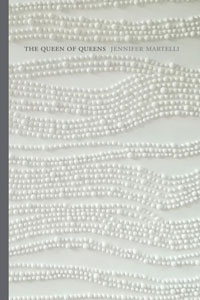
The Queen of Queens by Jennifer Martelli
Bordighera Press 2022
Reviewer: Anne Elezabeth Pluto, Author of The Deepest Part of Dark (Unlikely Books, NOLA}
Queen of Queens is a visceral brilliant book - a painful honest book. Scratching the soil of female
hope and failure, Martelli is Cassandra with her prescient collection of poems, especially in the shadow
of the recent SCOTUS ruling on the 14th amendment. Using Geraldine Ferraro as a 1984 touchstone for
historical and personal events, Martelli intertwines Ferraro's pearls as a caduceus to connect the
poems and warn the reader of the return to 1980. The "1980's when we all looked like small men with
big shoulder pads." We meet Astrologers, Stregas, woman politicians, entertainers, and a President's wife.
Each strung in their own Kodak moment - as well as the Kodak moments of the speaker who has stripped her
heart to its sacred center on a journey to be seen and heard. In "Prognostication" the Strega is looking
for signs in olive oil and water - "We wanted to see the future." The Strega returns to guide both the
speaker and the reader: "You are unable to avoid what you are used to..." We are confronted with a mirror
of our own hard-won experiences and the painful truth of the 1984 moment - Women will not vote for other
women. Women don't even like other women. Women don't even hear other women. On this wild ride of the 1980's
the speaker says: "I carried a skinny mirror back then - I wrote my name in powder, deep... Can you hear me?
you are heard, they said: they said, you are beautiful. In "The Vanquished" the speaker names the feminine
heavens: "I wanted to create my own night sky, a collage of stars, constellations: The Queen, the Coke Whore,
the Madonna, The Constellation of Return." Asking: "Can I rule as a monolith? Can I rule as a woman who's
had not one but two, two abortions? And still not be sad? Can I rule as a woman who is not sad at all?"
Yes. We can; we will. Jennifer Martelli has given us the permission and inspiration to do so. She is the Queen of Queens.

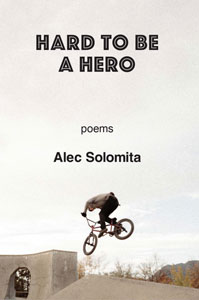
HARD TO BE A HERO, poems by Alec Solomita
Kelsay Books, 2022
Reviewed by Susan Isla Tepper
If this were the wild west, and Alec Solomita was Sheriff in an unruly town, with saloons and brothels and cowboys
run amok, his would be the voice of reason.
The poems he writes are humane, funny, heartbreaking and often self-deprecating. Not necessarily all in the same poem.
The point is that these are poems stripped of pretense. What he thinks, how he thinks, he writes.
I noticed that immediately when I first became a fan of his work.
For instance, in this tiny poem:
Nightlife
In all my dreams I'm young again,
pale green as the underside of leaves
in my climbing tree in the backyard.
Is this not the deepest wish of every living form?
I believe the purpose of poetry is to take out the raw goods and form them so they will touch the reader
in some unique way. Which is the essence of all creative work. There needs to be an entry point for those
who see/read/listen to the offering. Solomita is a poet who offers a wide entry.
I've Walked Down
I've walked down this uneven brick sidewalk
in bright December, in springtime splendor,
in evening dress, unshaven, unshorn, balding
and drunk, slick and slim, smooth and sober,
in t-shirts and cargo shorts on closing summer nights.
I walked up a similar sidewalk, swollen
reddish brick, the heart of old Boston,
where I first smoked grass forty-eight
years ago in a tiny apartment with a skinny
blonde who assured me that one of these times
I would feel it. And she was right. I feel it now,
an old man, high as a kite (the bird, not the toy)
looking down on my own life, my only prey.
This is a setting I dove right into, though mine were other rooms in other cities. But the ethos is of the same
coarse texture that I recall from my own earlier decades. When poets take on a means to an end: such as the sidewalk,
here, it can flow north, south, east, west or even sink into the ground. With or without the poet in sight.
While still maintaining residency in the poet's mind, or, if you prefer, the poet's soul.
The imprint has been hardened for eternity. As they say: Art Only Endures.
Published by Kelsay Books and Available from all Book Sellers.

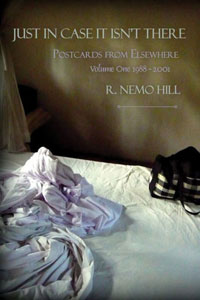
Just In Case It Isn't There: Postcards From Elsewhere: Volume One, 1988-2001
by R. Nemo Hill
DOS MADRES PRESS
Reviewed by John Riley
R. Nemo Hill's new book, Just In Case It Isn't There, is something too seldom seen today.
It isn't a book in which a poet, and Hill is a gifted poet, decides it's time to explode into a wider
scene with a memoir, or a volume of wry essays designed to captivate readers with overly revised expressions.
Hill is after something made more profound by its simplicity. He calls these prose works postcards, not postcards
from the edge, there is no hysteria here, but postcards from an actual, lived life of a writer who is capable of
making moments live again. Written between 1988 and 2001, and centered around his travels in Indonesia and Europe,
these are excerpts of experience, not so much in reflection as in the moment, moments that don't seem to be written
as much as placed on the page. Hill is often able to accomplish this with by the clairty of his imagery.
Take this excerpt from a single paragraph entitled "Heaven and Earth," written on the 18th of February, 1992 in Bali:
I look up, closing the book in my lap. A divine afternoon on the whole. Two yellow kittens, twin suns, are following
a woman in a snow-white brassiere-the three of them walking quickly, in a line, on a path, on this windy day-while a
child calls out in a very foreign tongue somewhere behind them. Heaven on this earth does pass so quickly.
I don't want to give the impression we are reading a diary or letters. The reflections are of the moment, the
clear moment, not reflections of the intricacies of a personal life. Here is another excerpt taken from another
single paragraph titled "But Why This Talk Of Drowning," written on the 20th of February, 1993, in which the
imagery sits atop darker introspection:
On my last day in Amsterdam, Vermeer's woman in blue refuses so calmly to look at me that I stand before her
for over an hour, unable to write the lines of the letter she is reading. I wonder, after she raises her eyes
at last and lays her letter aside, whether she too will feel this desire to walk and go on walking-despite the
chill in the air, and the still cold water of the narrow canals-too black to reflect a stormy sky? It is suicide
water, I remember whispering calmly to myself, its chill will numb anyone who plunges into it, its darkness will
soon swallow and hide and forget one-.
Here a moment many of us have experienced-being drawn almost too deeply into a painting or photograph-something
I have come to think of as the gift of "stareability"-is placed squarely on the page for us to feel again. But
this moment of looking is opened up by the contemplation of the end, of death, that comes to us when we see the
past made present, but still, inevitably, temporary. But perhaps the most telling, and brilliant part of this
excerpt, is the em dash at the end. The thought does not end. Such thoughts never end.
Just In Case It Isn't There is a book much like Vermeer's woman in blue. The past made present as we
stare at the moment through the imagery and thought of a gifted artist. It is a book that can be read in sequence,
to travel through the nearly fifteen years, or can be dipped into whenever one needs to be in a moment, to see a
sliver of existence, to touch the mind of another, which may be, when all is said, the ultimate gift of art.

The Mirror Masks Nothing by Kevin M. Hibshman and John Patrick Robbins
Poetry/Whiskey City Press
Reviewed by Susan Isla Tepper
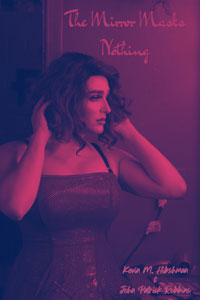
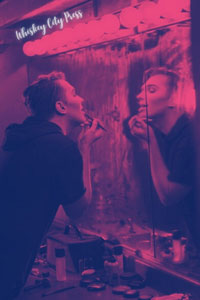
Two male poets collaborate on a poetry book about love, from entirely different perspectives. This is a first,
that I've read. I found the book to be profoundly humane in its writing and conception. A beautiful project.
Two men accepting and respecting the other's choices.
Who do you love?
The front cover is moody, done in shades of purple and fuschia with splashes of black.
It features a sexy female dressed in a shimmering outfit, and showing some skin, while primping at
a [presumed] mirror. The back cover, also in this same purply-fuschia tone, is of a man at a mirror
applying lip paint. It begs the question: Is love simply love? (If yes-well there's an end to that
conundrum dredged up by zealots and fearful people).
The book is divided in two sections. It begins with the poetry of Kevin Hibshman who examines
how he views love and its concurrent losses:
I Am Afraid To Touch You
Afraid of where it might hurt.
I want to cradle you like a newborn in my tired arms and
sing you to sleep but fear stays me.
This is a strange place.
It is a night with no day.
I go through the motions and move like a ghost through a
maze.
Repetition makes me sick.
I am your nurse now.
I make your tea and cook your meals.
I pick up prescriptions and do the laundry.
We do not speak of what we have lost.
We watch the world soldier on as it would with or without
us.
In the opinion of the reviewer (me) love should never be a political act, but should rise naturally from
out of our flowering deep, as this poem does. Love should function according to what constitutes the
makings of love for each of us.
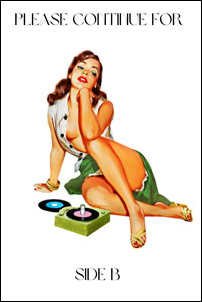
The beginning page of SIDE B is a dedication from John Patrick Robbins to Kevin Hibshman that concludes with
Robbins words: Love yourself for you're the truest friend you will ever know.
And this poem by John Patrick Robbins strikes harder truths:
Second String Loser
I have always been everyone's second choice opposed to first
in anything.
In writing I am a misfit, in life I am something far worse.
I am that good time and nothing more.
A one-night-stand who is great for an escape but none ever
care to know my reality.
People believe a persona, far easier than ever choosing to
know a fragile ego.
I am a drink and a simple screw.
I can be the man to the delusional.
And never the constant of anyone's continued reality.
Wet cement is smooth upon the pour yet hardens ever
quickly with time.
The cracks within the structure are seldom paid any
attention.
Just simply walked upon as I.
Truth hurts but will never change.
They only notice when a flaw trips them up.
People seldom look down.
My words are much like myself.
A monument to sadness and truth.
Play it out slow as the music fades.
We only burden ourselves with that which can never love in
return.
We are all whores. It just matters to what degree.
This poem speaks of universal truths. People who think they are perfection are suffering from delusions.
I would rather know an honest sinner than a fake angel any day of the week.

International Poetry Spotlight
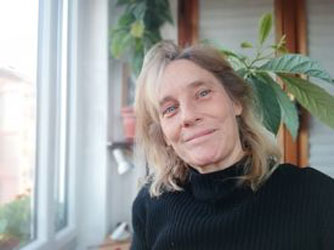
Antje Stehn, Germany, resides in Italy. Poet, visual artist, art curator, member of German Exil- PEN.
Since 1980 she has been showing her art work in international exhibitions around Europe and the US. Since
2014 she is organizing poetic-artistic performances. She is part of the international Collective "Poetry is my Passion."
Co-editor of the poetry magazine TamTamBumBum, Los Ablucionistas and Teerandaz. She is member of the direction
committee of the Piccolo Museo della Poesia of Piacenza, Italy. In 2022 she published her most recent book
"Grotesk" with Expeditionen Verlag. Her poems are translated into ten different languages and published in
numerous international Anthologies. Since 2020 she is curating the art-poetry project "Rucksack a Global
Poetry Patchwork which involves more than 250 international poets."
Metaphorize!
There are no facts
outside of poetry
we are the protagonists
of our words
we cut fabric with a sharp knives
put pastries in our mouths
sip wine from plastic cups
intent on learning
the so-called tongue of the earthworm
wine drinkers know
the struggle between heaviness
and verticality
between a breath and its suspension
a hyacinth grows
on a long stem
while the bulb
withers in the soil
German version
Metaphorisiere!
Es gibt keine Dinge
außerhalb der Poesie
wir sind die Protagonisten
unserer Worte
schneiden den Stoff mit scharfen Messern
stopfen Gebäck in unsere Münder
schlürfen Wein aus Plastikbechern
in der Absicht
die sogenannte Sprache der Regenwürmer
zu erlernen
Weintrinker wissen vom Kampf
zwischen Schwere und Vertikalität
zwischen atmen und Atem anhalten
eine Hyazinthe wächst
hoch hinaus auf langem Stiel
während ihre Zwiebel in der Erde
verschrumpelt
Antje Stehn, Germany-Italy
Some special characters may not have been used in this newsletter, because some email programs do not display them correctly.

Červená Barva Press Staff
Gloria Mindock, Editor & Publisher
Flavia Cosma, International Editor
Helene Cardona, Contributing Editor
Andrey Gritsman, Contributing Editor
Juri Talvet, Contributing Editor
Renuka Raghavan, Fiction Reviewer, Publicity
Karen Friedland, Interviewer
Gene Barry, Poetry Reviewer
Miriam O' Neal, Poetry Reviewer
Annie Pluto, Poetry Reviewer
Christopher Reilley, Poetry Reviewer
Susan Tepper, Poetry Reviewer
Neil Leadbeater, Poetry Reviewer
William J. Kelle, Webmaster
See you next month!


If you would like to be added to my monthly e-mail newsletter, which gives information on readings,
book signings, contests, workshops, and other related topics...
To subscribe to the newsletter send an email to:
newsletter@cervenabarvapress.com
with "newsletter" or "subscribe" in the subject line.
To unsubscribe from the newsletter send an email to:
unsubscribenewsletter@cervenabarvapress.com
with "unsubscribe" in the subject line.

Index |
Bookstore |
Our Staff |
Image Gallery |
Submissions |
Newsletter |
Readings |
Interviews |
Book Reviews |
Workshops |
Fundraising |
Contact |
Links
Copyright @ 2005-2022 ČERVENÁ BARVA PRESS - All
Rights Reserved
|

